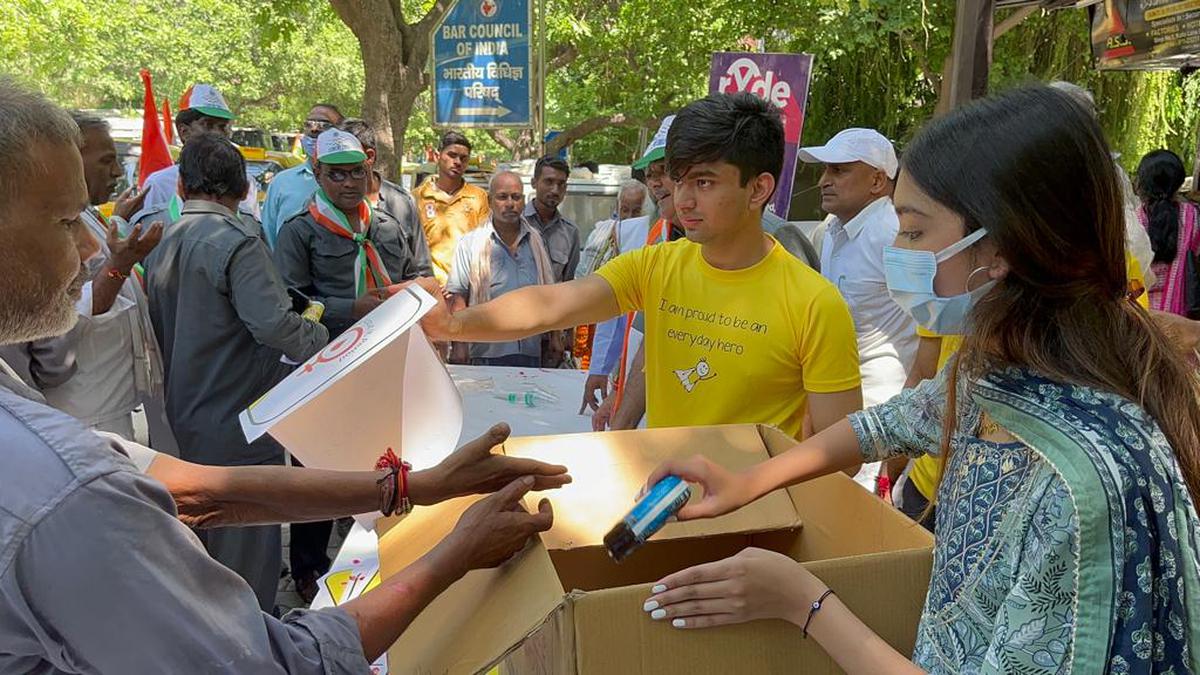Ahaana Bharat Ram of The Shri Ram School is on a campaign distributing free sanitary napkins among women who have no wherewithal to buy pads
Ahaana Bharat Ram of The Shri Ram School is on a campaign distributing free sanitary napkins among women who have no wherewithal to buy pads
Even as a student of one of Delhi’s top schools, Ahaana would sneak out with her sanitary pad to the washroom whenever she required a change during her period. “We are a group of well-educated and privileged students but still it is kind of embarrassing,” she says.
Her own experience made her wonder about girls in less educated families in remote India. Just before the pandemic shut down everything in 2020, Ahaana then in class IX, was researching for a school project and happened to read an article that suggested only 26% of women in India wore sanitary pads during their menstrual cycle.
“I was shocked by the statistics and felt many young girls like us and their mothers perhaps needed help,” she says. To check out the realities women deal with every month, she and her classmate Anshi Aggarwal started an initiative called Spot On & Off and chose one of the most backward districts of Mewat in Haryana.
They surveyed Kherla, Rewason, Nangli and Sonkh and the stigma and shame surrounding periods in the villages was a revelation. Last winter when they returned to start menstrual hygiene workshops, it turned out to be a challenge for the girls to start conversations around menstruation. “We saw the problem; how a natural body function was accompanied by multiple and deeply entrenched taboos and myths and realised that the power to enact a change lay with the women themselves, “says Ahaana. She remembers several girls who pleaded with them to convince their mothers to use pads. “They said their mothers were ashamed to talk about periods or ask for help and did not know how to dispose off pads,” she adds.
While the mothers lacked in menstrual hygiene awareness, the daughters perhaps knew more but had poor access to menstrual products or did not have the money to buy pads. “Together, they fuelled our determination to stop period poverty and period shaming,” says the 16-year-old, now studying in class XI.
Ahaana shouldered the campaign after her friend dropped out. At a parent-teacher meeting in school, she put up a stall to pitch her idea and raised ₹30,000. This was followed by more donations that helped her buy reusable cloth pads from Goonj while a doctor committed to donating batches of 1,000 disposable pads. With two of her school friends and the cook’s daughter at her home volunteering to accompany her, Ahaana now conducts periodic workshops explaining to the women the process of menstruation and the importance of menstrual hygiene and helps them rid themselves of all fear, doubts and stigma. She has also tied up with NGOs to further her mission.

Distribution of menstrual health awareness posters and sanitary pads among Delhi auto drivers
| Photo Credit: Special Arrangement
This Independence Day, she collaborated with CRY’s pan-India campaign ‘Let’s talk about it! Period!‘ and the Delhi Auto Rickshaw Union to demystify taboos and normalise periods. Over 1,000 auto drivers pledged to raise awareness against period shaming. They were given packs of reusable sanitary pads free of cost for passengers in need and posters on menstrual health and hygiene for display on their vehicles for the next three months.
Delhi Auto Rickshaw drivers have joined the campaign on menstrual health awareness
| Photo Credit: Special Arrangement
With Delhi Police extending its support for the cause and auto wallahs playing a critical role in spreading awareness, Ahaana now also dreams of seeking the help of the Delhi Government to teach about menstruation in its schools and has sought a meeting with the officials.
“The objective is to make a difference and shun the culture of stigma and silence around menstruation,” says Ahaana, who in the last six months has distributed 6,500 reusable cloth pads in Rajasthan, Bengaluru, Madhya Pradesh, Bihar, Haryana and Delhi. “We are trying to collect feedback every three months. The packs of eight reusable cloth pads should last them a year; by then the women should be self-motivated to continue safe menstrual health practices on their own,” she says, adding, “It is still a huge work in progress.”
























